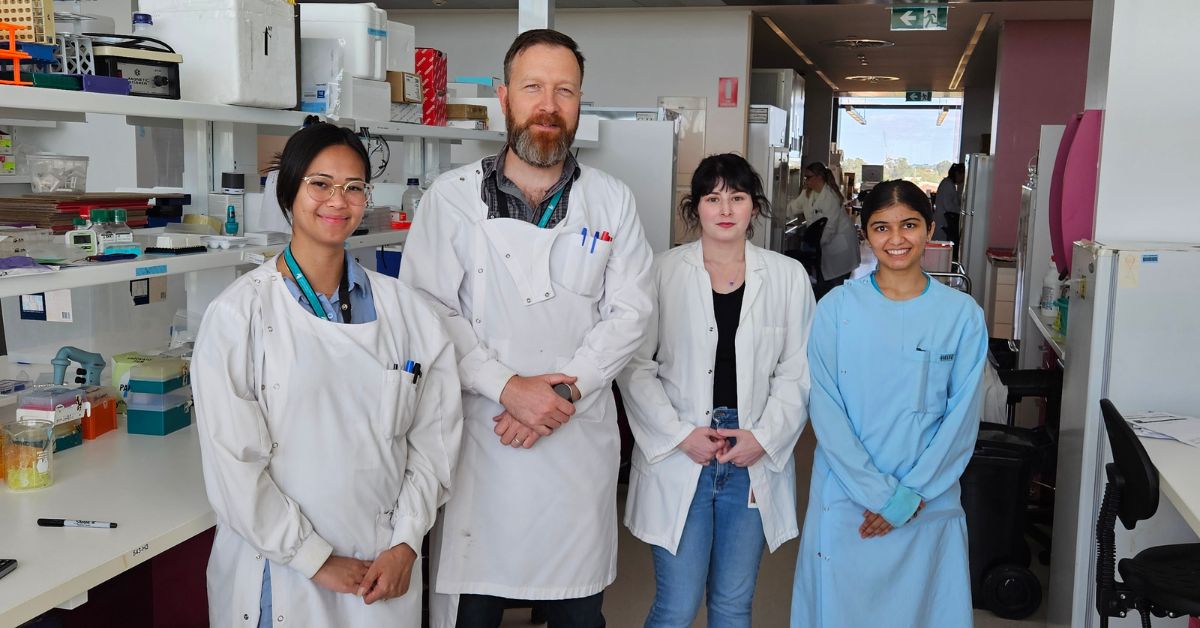Through icare, the Dust Diseases Board has funded Dr Alistair Cook’s research over three years endeavouring to create better outcomes for patients who are diagnosed with mesothelioma.
Dr Cook was drawn to research in dust diseases as he saw it as an area where he could truly make a difference.
A mesothelioma tumour is awful, not just for the patient but also for their families. Our clinical trials aim to benefit people today and others down the line.
A team of five researchers led by Dr Cook, is experimenting on mice with mesothelioma and asbestos related diseases and has so far seen a 100 percent cure rate after combining immunotherapy with modified radiation.
“It’s worked better than we possibly thought that it might do.”
Dr Alistair Cook, NCARD
Immunotherapy drugs have been helpful for about 30% of patients with mesothelioma and Dr Cook’s research is beginning to indicate that combining those drugs with radiotherapy could provide a breakthrough in treatment for some of the remaining 70%.
Dr Cook and his team have been working with a gentler form of radiation which spares the tissue surrounding the tumour and helps to alter the structure of the blood vessels within the tumour.
Typically, tumours have quite chaotic structures which don’t behave like healthy tissue, but by modifying the tumour with low dose radiotherapy treatment; blood vessels become less disorganised, and helps the immune cells get into the tumour to destroy it.
“Together with a radiation physicist, we came up with a strategy which doesn’t just cause mass death and destruction of the tissue but helps to remodel the way that the blood vessels work in the tumour, so the immune cells can get into the tumour, which means you might have a better chance of a response.”
The research is also looking at whether treating one tumour could have a systemic response.
“A single tumour can be treated in a person and the immunotherapy treatment might then be able to cure lots of other tumours. In a worst-case scenario, we can radiate individual tumours and then give immunotherapy”.
Dr Cook is working closely with colleagues across the scientific community to solve as many of the remaining issues as possible over the next two years before being able to proceed with a clinical trial.
The research draws on a team of oncologists, radiation physicians and scientists. It’s a painstaking process requiring endless patience and perseverance.
“I know a lot of it sounds interesting and glamorous, but 99% of the time you’re reviewing papers and pipetting a tiny volume of colourless liquid into a tiny volume of another colourless liquid. And your experiment doesn’t work, and you go back and do it all again.”
Since 1983, the Dust Diseases Board has been funding research to reduce the risk of people developing dust diseases and to optimise outcomes for people with dust diseases. Between 2016 and 2023, the Board funded 55 grants worth more than $13 million.
For Dr Cook, the grant he received is enabling him and his team to continue invaluable work which could revolutionise the treatment of mesothelioma. He is confronted with the importance of his work each day as he walks through the hospital and past the patients outside the cancer ward to reach his laboratory.
“I try in some small way to make a difference to these people and their families. I’m still here, love the job, love the work and find it very interesting. I’m very fortunate to be doing this.”
This article originally appeared at https://www.icare.nsw.gov.au/news-and-stories.


